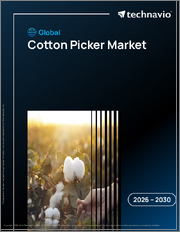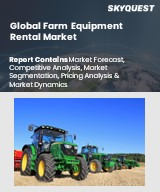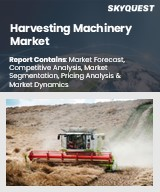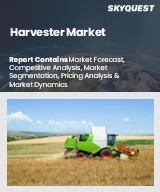
|
시장보고서
상품코드
1661076
농업용 수확기 시장 보고서 : 제품 유형별, 구동 유형별, 용도별, 지역별(2025-2033년)Agricultural Harvester Market Report by Product Type (Combine Harvester, Forage Harvester), Drive Type (Four-Wheel Drive Harvester, Two-Wheel Drive Harvester), Application (Wheat, Rice, Maize, Barley, and Others), and Region 2025-2033 |
||||||
농업용 수확기 세계 시장 규모는 2024년 349억 달러에 달했습니다. 향후 IMARC Group은 2033년까지 시장 규모가 498억 달러에 달해 2025년부터 2033년까지 4%의 연평균 성장률(CAGR)을 기록할 것으로 예상하고 있습니다.
농업용 수확기는 농부들이 곡물을 수확하는 데 사용합니다. 수확, 탈곡, 탈곡의 세 가지 주요 작업을 수행합니다. 이 수확기는 단기간에 농작물 생산량을 늘리기 위해 사용되며, 그 활용은 전통적인 수확 방법보다 더 나은 것으로 입증되었습니다. 또한 수확기와 같은 기계와 도구는 농작업을 최소화하고, 생산성을 향상시키고, 작물 생산 비용을 낮추고, 수확 손실을 크게 줄이는 데 도움이 되기 때문에 농작업은 꾸준히 기계와 도구에 의존하고 있습니다.
시장 동향:
세계 일부 지역에서는 노동력 부족이 발생하고 있으며, 농부들은 기계화로 전환하고 있습니다. 이에 따라 많은 정부가 농업 생산량을 늘리기 위해 기계 사용을 장려하고 있습니다. 정부는 농부들에게 보조금과 필요한 교육을 제공하고 있으며, 이는 수확기 판매를 촉진하고 있습니다. 또한, 업체들은 편의성과 효율성을 높이기 위해 원격 측정 및 지능형 감지 기술로 장비를 지속적으로 업그레이드하고 있으며, GPS 및 내비게이션 시스템과 같은 새로운 기능도 수확기에 탑재되어 보다 정확한 작업을 수행하는 데 도움이 되고 있습니다. 수확기 수요를 촉진하는 다른 요인으로는 식량 수요 증가, 농촌 소득 증가, 현대식 농법 채택 증가 등이 있습니다.
본 보고서에서 다루는 주요 질문
- 2024년 세계 농업용 수확기 시장 규모는?
- 2025-2033년 세계 농업용 수확기 시장의 예상 성장률은?
- 세계 농업용 수확기 시장을 이끄는 주요 요인은 무엇인가?
- COVID-19가 세계 농업용 수확기 시장에 미치는 영향은?
- 세계 농업용 수확기 시장의 제품 유형별 시장 분석은?
- 세계 농업용 수확기 시장의 용도별 시장 현황은?
- 세계 농업용 수확기 시장의 주요 지역은?
- 세계 농업용 수확기 시장의 주요 플레이어/기업은?
목차
제1장 서문
제2장 조사 범위와 조사 방법
- 조사 목적
- 이해관계자
- 데이터 소스
- 1차 정보
- 2차 정보
- 시장 추정
- 상향식 접근
- 하향식 접근
- 조사 방법
제3장 주요 요약
제4장 소개
- 개요
- 주요 업계 동향
제5장 세계의 농업용 수확기 시장
- 시장 개요
- 시장 실적
- COVID-19의 영향
- 시장 내역 : 제품 유형별
- 시장 내역 : 구동 유형별
- 시장 내역 : 용도별
- 시장 내역 : 지역별
- 시장 예측
제6장 시장 내역 : 제품 유형별
- 콤바인
- 시장 동향
- 시장 예측
- 사료 수확기
- 시장 동향
- 시장 예측
제7장 시장 내역 : 구동 유형별
- 사륜구동 수확기
- 시장 동향
- 시장 예측
- 이륜구동 수확기
- 시장 동향
- 시장 예측
제8장 시장 내역 : 용도별
- 밀
- 시장 동향
- 시장 예측
- 쌀
- 시장 동향
- 시장 예측
- 옥수수
- 시장 동향
- 시장 예측
- 보리
- 시장 동향
- 시장 예측
- 기타
- 시장 동향
- 시장 예측
제9장 시장 내역 : 지역별
- 북미
- 시장 동향
- 시장 예측
- 아시아태평양
- 시장 동향
- 시장 예측
- 유럽
- 시장 동향
- 시장 예측
- 중동 및 아프리카
- 시장 동향
- 시장 예측
- 라틴아메리카
- 시장 동향
- 시장 예측
제10장 SWOT 분석
- 개요
- 강점
- 약점
- 기회
- 위협
제11장 밸류체인 분석
제12장 Porter's Five Forces 분석
- 개요
- 구매자의 교섭력
- 공급 기업의 교섭력
- 경쟁 정도
- 신규 참여업체의 위협
- 대체품의 위협
제13장 가격 분석
제14장 경쟁 구도
- 시장 구조
- 주요 기업
- 주요 기업 개요
- Deere & Company
- CNH Industrial N.V.
- AGCO Corporation
- CLAAS KGaA mbH
- Mahindra & Mahindra Ltd.
- Maschinenfabrik Bernard Krone GmbH
- Yanmar Holdings Co., Ltd.
- POTTINGER Landtechnik GmbH
- Dewulf BV
- Lovol Heavy Industry CO., LTD
- Lely International N.V.
- Ploeger Machines BV
- PREET AGRO Industries(P) Limited
- SDF S.p.A.
- Sampo Rosenlew Ltd.
The global agricultural harvester market size reached USD 34.9 Billion in 2024. Looking forward, IMARC Group expects the market to reach USD 49.8 Billion by 2033, exhibiting a growth rate (CAGR) of 4% during 2025-2033.
Agricultural harvesters are employed by farmers to harvest grain crops. They perform three major tasks - reaping, threshing and winnowing. These harvesters are used to increase farm production in a short time and their utilization has proved to be better than conventional harvesting methods. Moreover, agricultural practices are steadily becoming dependent on machines and tools, such as harvesters, as they help to minimize farm drudgery, enhance productivity, lower crop production costs and significantly bring down harvest losses.
Market Trends:
Several regions across the globe are experiencing a shortage of labor force which has led farmers to make a shift towards mechanization. In line with this, numerous governments are promoting the use of equipment to boost farm output. They are offering subsidies and necessary training to farmers which, in turn, is propelling the sales of these harvesters. Furthermore, vendors are consistently upgrading their equipment with telemetry and intelligent sensing technologies to enhance convenience and efficiency. Other new features such as GPS and navigation systems have also been incorporated in these harvesters to help in carrying out operations with more precision. Other factors driving the demand of harvesters include increasing food demand, rising rural incomes, increasing adoption of modern farming practices, etc.
Key Market Segmentation:
Breakup by Product Type:
- Combine Harvester
- Forage Harvester
Breakup by Drive Type:
- Four-Wheel Drive Harvester
- Two-Wheel Drive Harvester
Breakup by Application:
- Wheat
- Rice
- Maize
- Barley
- Others
Breakup by Region:
- North America
- Asia Pacific
- Europe
- Middle East and Africa
- Latin America
Competitive Landscape:
The report has also analysed the competitive landscape of the market with some of the key players being Deere & Company, CNH Industrial N.V., AGCO Corporation, CLAAS KGaA mbH, Mahindra & Mahindra Ltd., Maschinenfabrik Bernard Krone GmbH, Yanmar Holdings Co., Ltd., POTTINGER Landtechnik GmbH, Dewulf BV, Lovol Heavy Industry CO., LTD, Lely International N.V., Ploeger Machines BV, PREET AGRO Industries (P) Limited, SDF S.p.A., and Sampo Rosenlew Ltd.
Key Questions Answered in This Report
- 1.What was the size of the global agricultural harvester market in 2024?
- 2.What is the expected growth rate of the global agricultural harvester market during 2025-2033?
- 3.What are the key factors driving the global agricultural harvester market?
- 4.What has been the impact of COVID-19 on the global agricultural harvester market?
- 5.What is the breakup of the global agricultural harvester market based on the product type?
- 6.What is the breakup of the global agricultural harvester market based on the application?
- 7.What are the key regions in the global agricultural harvester market?
- 8.Who are the key players/companies in the global agricultural harvester market?
Table of Contents
1 Preface
2 Scope and Methodology
- 2.1 Objectives of the Study
- 2.2 Stakeholders
- 2.3 Data Sources
- 2.3.1 Primary Sources
- 2.3.2 Secondary Sources
- 2.4 Market Estimation
- 2.4.1 Bottom-Up Approach
- 2.4.2 Top-Down Approach
- 2.5 Forecasting Methodology
3 Executive Summary
4 Introduction
- 4.1 Overview
- 4.2 Key Industry Trends
5 Global Agricultural Harvester Market
- 5.1 Market Overview
- 5.2 Market Performance
- 5.3 Impact of COVID-19
- 5.4 Market Breakup by Product Type
- 5.5 Market Breakup by Drive Type
- 5.6 Market Breakup by Application
- 5.7 Market Breakup by Region
- 5.8 Market Forecast
6 Market Breakup by Product Type
- 6.1 Combine Harvester
- 6.1.1 Market Trends
- 6.1.2 Market Forecast
- 6.2 Forage Harvester
- 6.2.1 Market Trends
- 6.2.2 Market Forecast
7 Market Breakup by Drive Type
- 7.1 Four-Wheel Drive Harvester
- 7.1.1 Market Trends
- 7.1.2 Market Forecast
- 7.2 Two-Wheel Drive Harvester
- 7.2.1 Market Trends
- 7.2.2 Market Forecast
8 Market Breakup by Application
- 8.1 Wheat
- 8.1.1 Market Trends
- 8.1.2 Market Forecast
- 8.2 Rice
- 8.2.1 Market Trends
- 8.2.2 Market Forecast
- 8.3 Maize
- 8.3.1 Market Trends
- 8.3.2 Market Forecast
- 8.4 Barley
- 8.4.1 Market Trends
- 8.4.2 Market Forecast
- 8.5 Others
- 8.5.1 Market Trends
- 8.5.2 Market Forecast
9 Market Breakup by Region
- 9.1 North America
- 9.1.1 Market Trends
- 9.1.2 Market Forecast
- 9.2 Asia Pacific
- 9.2.1 Market Trends
- 9.2.2 Market Forecast
- 9.3 Europe
- 9.3.1 Market Trends
- 9.3.2 Market Forecast
- 9.4 Middle East and Africa
- 9.4.1 Market Trends
- 9.4.2 Market Forecast
- 9.5 Latin America
- 9.5.1 Market Trends
- 9.5.2 Market Forecast
10 SWOT Analysis
- 10.1 Overview
- 10.2 Strengths
- 10.3 Weaknesses
- 10.4 Opportunities
- 10.5 Threats
11 Value Chain Analysis
12 Porters Five Forces Analysis
- 12.1 Overview
- 12.2 Bargaining Power of Buyers
- 12.3 Bargaining Power of Suppliers
- 12.4 Degree of Competition
- 12.5 Threat of New Entrants
- 12.6 Threat of Substitutes
13 Price Analysis
14 Competitive Landscape
- 14.1 Market Structure
- 14.2 Key Players
- 14.3 Profiles of Key Players
- 14.3.1 Deere & Company
- 14.3.2 CNH Industrial N.V.
- 14.3.3 AGCO Corporation
- 14.3.4 CLAAS KGaA mbH
- 14.3.5 Mahindra & Mahindra Ltd.
- 14.3.6 Maschinenfabrik Bernard Krone GmbH
- 14.3.7 Yanmar Holdings Co., Ltd.
- 14.3.8 POTTINGER Landtechnik GmbH
- 14.3.9 Dewulf BV
- 14.3.10 Lovol Heavy Industry CO., LTD
- 14.3.11 Lely International N.V.
- 14.3.12 Ploeger Machines BV
- 14.3.13 PREET AGRO Industries (P) Limited
- 14.3.14 SDF S.p.A.
- 14.3.15 Sampo Rosenlew Ltd.



















